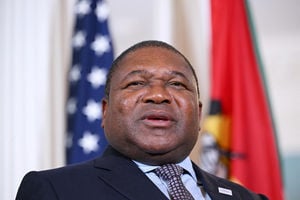
The October 9 presidential election in Mozambique, as with every poll in the past four decades, will bring a duel between the ruling Frelimo party and opposition groups.
In Mozambique, Presidential elections are scheduled for October 9. And this, as with every poll in the past four decades, will bring a duel between the ruling Frelimo party and opposition groups. Only one side has been winning so far, and the other sides have often claimed fraud. Sometimes conflict erupts, at other times the opposition and the government sign a truce.
But this election has something consistent: questions on the strength, if not relevance, of the opposition in this democracy.
Frelimo’s candidate Daniel Chapo has gained more support, a signal of weakening his direct opposition competitors.
Former Presidents Joaquim Chissano and Armando Guebuza have publicly joined their ruling party’s electoral campaign to convince the more than 17 million voters registered, including the more than 300,000 people registered abroad, that Frelimo and its presidential candidate are the best choices.
Even the country’s first president’s widow, Graça Machel, who ended up marrying South Africa’s Nelson Mandela, has also joined choir thus increasing the chances of Frelimo and its candidate winning the polls.
Frelimo, or Mozambique Liberation Front in English, has ruled the country since it gained independence from Portugal in 1975 and is ahead of its competitors for the October 9 general election.
As such, other parties and their candidates have competed only to fulfil their duties without a chance to oust Frelimo from power. That, however, may have offered them some lessons, which are also in plenty from their peers in neighbouring Malawi and Zambia, where they dethroned the ruling parties.
Frelimo will face Mr Ossufo Momade, the main opposition Renamo’s candidate, Mr Lutero Simango representing the MDM and Mr Venâncio Mondlane who is running as an independent candidate.
João Feijó, a political analyst in Mozambique argues that Frelimo has everything in its favour for these polls and the question should be about who will take second place – which could signal the second most popular movement.
“The opposition has little room to manoeuvre and everything indicates that it will not be able to use its strength in these elections,” Mr Feijó told The Nation.
The Washington-based International Republican Institute (IRI) concluded that though Frelimo – and its candidate – has a better chance of winning, it is unlikely that the electoral process will enable voters to equitably make their choice.
“The political opposition is very divided and comparatively weaker than Frelimo, more so than in previous elections.”
According to local observers, during the second week of the electoral campaign, Frelimo continued to have the strongest one, with 47 percent of the events observed, followed by Renamo (27 percent), MDM (15 percent) and PODEMOS (11 percent).
In a report, Consórcio Eleitoral Mais Integridade (More Integrity Electoral Consortium), it attributed this to the fact that Frelimo benefits most from the use of public goods and personnel (23 percent of the events observed); against 2 percent for Renamo and 1 percent for MDM.
The watchdog that continues to observe the electoral campaign in all the country's provinces and in Maputo city has 250 observers spread across 80 of the country's 154 districts.
The analysis shows that in the broadcast media, with the exception of the state-owned Rádio Moçambique, which has tried to give a balanced approach in terms of space, number of pieces, opening pieces and rotation of protagonists, all the television channels have given Frelimo more favourable coverage.
The army, police officers and other authorities are also favouring the ruling Frelimo during the electoral campaign, which suggests that the opposition has few players in its favour.
Human Rights Watch (HRW) said that in recent months, the authorities have disrupted opposition party campaign meetings and other election related activities.
Security forces have often broken up peaceful protests, while journalists and activists have been detained for prolonged periods without charge, it said.
HRW adds that Mozambican police have committed widespread abuses against journalists and civil society activists that could impair their work ahead of elections scheduled for October 9, 2024.
The authorities have rarely investigated formal complaints of harassment, threats, physical assault, and arbitrary arrest and detention targeting those covering election activities.
The Media Institute of Southern Africa also reported that attacks against Mozambican journalists tend to increase during election years.
Mozambique has a reputation of lack of transparency during elections, according to observers’ post-election reports.
For the 2014 elections, Professor Adriano Nuvunga of Edurado Mondlane University in Maputo, wrote in a paper that Frelimo tended to make it difficult for opposition parties and candidates to campaign, though to a lesser extent than in the past.
The Commonwealth Observer Group was unable to conclude that all aspects of the 2019 presidential, national and provincial assembly elections in Mozambique were credible, peaceful and transparent, and cited increased violence and tensions, as well as incidents of serious irregularities and reports of intimidation of voters.
The US Department of State says that multiple national and international observers considered the Mozambique 2019 voting generally orderly but reported systemic vulnerabilities, such as inconsistent application of election procedures and lack of transparency during vote tabulation.
A number of foreign observers–including the EU and European Commonwealth–and domestic civil society organisations expressed concern over election irregularities.
The 2023 municipal elections were marked by irregularities and violence, and were not perceived to reflect the will of the people – presenting a challenge to the upcoming electoral process, IRI says.
The European Union (EU) called for this year's elections to be transparent and fraud-free, given the level of protest and alleged fraud reported by civil society and opposition parties in the sixth local elections.





